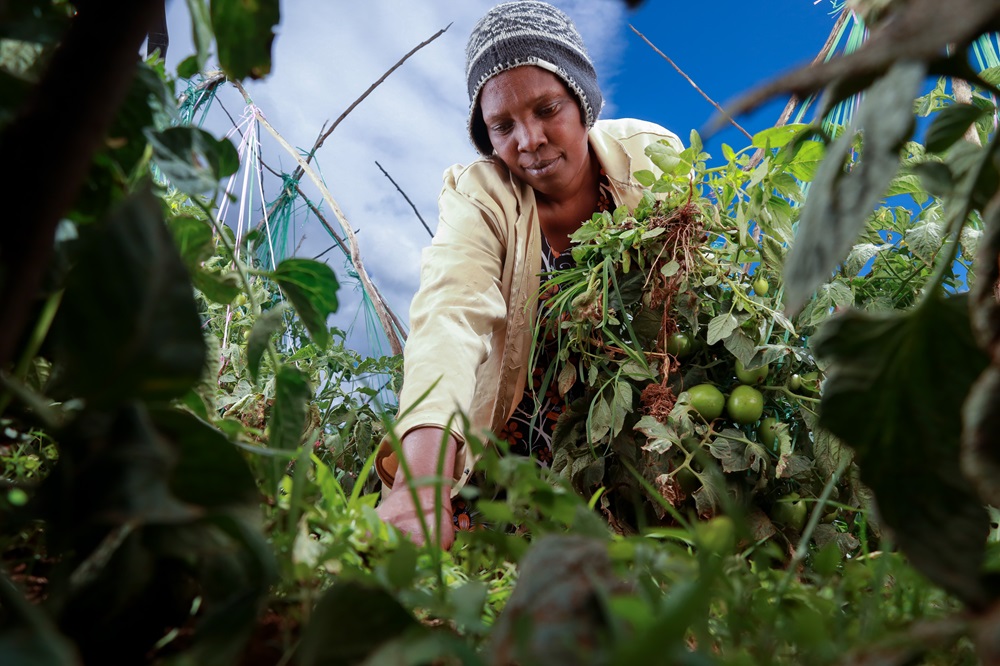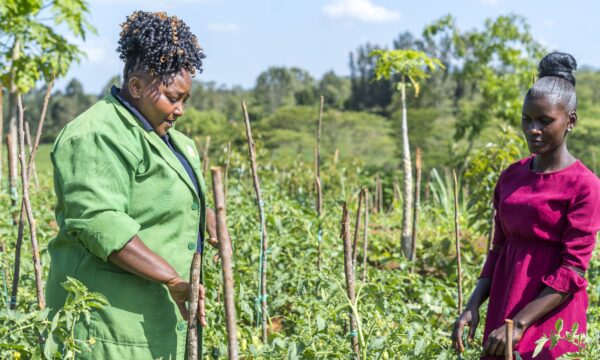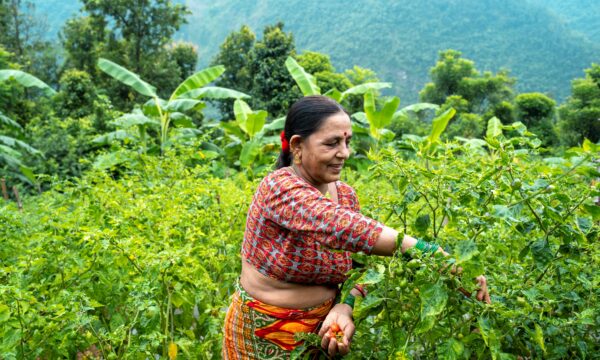
Climate change poses significant threats to the food security and livelihoods of women farmers writes Sandra Phelps, Gender Manager at CABI ahead of International Women’s Day on Saturday 8 March 2025. There are an estimated 215 million women smallholders globally. They account for nearly one-third of food production worldwide. Despite this critical role, women are far more vulnerable to climate shocks than men. The UN has calculated that four out of five people displaced by the impacts of climate change are women and girls. Many of them come from rural farming households.
This inequality is due to a number of reasons, including a lack of access to education, resources and land ownership. Agricultural trainings and extension services frequently overlook women. They are also often scheduled at times and in locations that are inaccessible to them. Without proper training, women may not be aware of new farming techniques. Innovative approaches could help them to cope with climate-induced challenges. Women often face obstacles to being included in agricultural trainings. They are also often underrepresented in decision-making positions in agricultural sectors.
However, plant health knowledge and resources could help them to better address climate challenges. This includes problems such as pest outbreaks. Inputs like fertilizers and pesticides, for example, can boost plant health and, therefore, food production. In areas affected by environmental changes, plant protection products can be game-changing. Yet women are far less able to leave their communities and travel to buy these much-needed inputs.
It is vital that any investment in climate change considers the differentiated needs of women. Improving women’s access to agricultural education and resources will not only improve agricultural productivity. It can also lead to increased household and community resilience to unforeseen shocks.
Overcoming gender norms in the agricultural sector
Cultural, environmental and societal norms compound inequality. In many countries, social norms affect women’s ability to access farming knowledge. The norms include expectations that men and women will not interact in public. This poses a challenge in many countries. In Pakistan, for example, male extension agents deliver most agricultural advisory services. Subsequently, the services may not always be accessible to women.
CABI’s PlantwisePlus programme is addressing the situation. In 2017, it created women-only plant clinics in Pakistan. Women plant doctors lead these clinics. Doing so enables women farmers to attend and gain access to essential plant health advice. The information they receive helps to empower them in agricultural decision-making.
One crucial benefit has been helping women farmers to adapt their agricultural practices to the changing climate. As weather patterns alter, new plant pests and diseases emerge. The clinics help women address these challenges. They share advice on climate-smart farming approaches. Moreover, the programme shares knowledge beyond plant health. It also covers subjects such as income generation, resource use and time allocation.
The women-only plant clinics have proved highly successful. They have enabled women farmers to achieve benefits similar to those of their male counterparts. Ultimately, they have empowered women, giving them the knowledge and skills they need to build resilience for the future.
Boosting women’s access to gender-focused biocontrol products
Generally, women have lower access to agricultural resources. They often rely on locally available and low-cost pest control. These solutions can include products such as homemade botanical extracts and repellents. Women might also rely on removing pests manually, by hand. However, these products and methods can be ineffective and time-consuming.
CABI is trialling two highly effective, low-risk biological control (biocontrol) microorganisms with women farmers. One is a commercial baculovirus, and the other is a local strain of Metarhizium rileyi. The trials focus on fall armyworm management on maize in Zambia. Notably, these science-backed products reduce the time burden for women. Biocontrols are more efficient when applied early after sowing. They prevent pests from spreading further, as small larvae are killed within days. This way, they reduce the need for pest management later in the season. Time-consuming manual control is, thereby, lessened.
Field trials with communities are already showing successful and promising results. They will equip women farmers with a new tool for sustainable farming. Labour-saving, nature-based solutions for managing fall armyworm benefit women farmers. They also foster empowerment and resilience. Moreover, they are better for the environment.
Gender-skills capability training
Equipping the next generation of agricultural professionals with climate and gender skills is essential. With greater knowledge, they can address the effects of climate change on women farmers. Incorporating new skills will help young extensionists to share knowledge with smallholders. Furthermore, it puts them in a stronger position to influence the development of climate-smart farming systems.
To support this goal, CABI is delivering a six-month training course. The training helps young people to build gender skills in agricultural research and policy. Taking place in Southeast Asia, both men and women attend. The course is directed at those focusing on integrated pest management (IPM), climate change and biodiversity. Projects within the course include:
•bibliographical analyses of gender
•gender dynamics and technology adoption, and
•gender differences in fall armyworm management strategies
The new cadre of agricultural professionals is learning how to put women’s empowerment into action. The training will integrate this knowledge into their professional careers.
Gender-focused climate-smart business opportunities
Training women in business skills equips them for future roles in the agricultural sector. In addition, it allows them to seize emerging employment opportunities. Moreover, it enables them to transform existing gender norms in the employment sector. Increasingly, climate change is driving the growth of new enterprises. These include opportunities in lower-risk plant protection products such as biocontrol.
CABI has provided young women with training in the production, distribution and application of biocontrol solutions. In this case, the products are tailored to manage fall armyworm in Zambia. However, the training also includes agricultural business models. Together, the young women trainees have developed sustainable business plans and explored income generation opportunities. This has resulted in a substantial increase in their incomes in the six months following the training.
The initiative has connected the young trainees with biocontrol trial projects. The trials are ongoing. However, once completed, the trainees will play an essential role in the agricultural supply chain. They will ensure that farmers, including women farmers, have access to climate-smart biocontrol products.
Empowering women to strengthen sustainable agricultural systems
Development organizations play a crucial role in improving climate and gender action in agriculture. They can achieve this improvement through a number of approaches. Gender analyses and focusing on gender at the projects’ onset, for example, can help. The right initiatives can level the playing field for women farmers. They can help them to sustainably increase yields, boost incomes and improve food security and overall well-being. Projects that help women to access education and resources are, therefore, critical. Investment in these projects is not only beneficial. It is essential for climate resilience and sustainable development.
Women play a key role in climate adaptation. They are often the ones who manage food, water and household resources during crises. By leading the response to climate disasters, women can drive adaptation, resilience and sustainability. Moreover, they can step into crucial roles as decision-makers. Through empowerment and leadership, they can further advance climate action and gender equality. Investing in women is essential for an equitable and sustainable future.
Additional information
Main image: A female farmer uprooting (Credit: CABI).
Donor acknowledgement
PlantwisePlus gratefully acknowledges the financial support of the Directorate-General for International Cooperation (DGIS), Netherlands; European Commission Directorate General for International Partnerships (INTPA, EU); the Foreign, Commonwealth & Development Office (FCDO), United Kingdom; the Swiss Agency for Development and Cooperation (SDC); and the Australian Centre for International Agricultural Research (ACIAR).
CABI, together with the Zambia Agriculture Research Institute (ZARI) and the University of Zambia (UNZA), is implementing the ‘Village-based biological control of fall armyworm in Zambia’ project, and gratefully acknowledges funding by the Australian Centre for International Agricultural Research (ACIAR).
Related News & Blogs
Biodiversity loss: How can we reclaim our landscapes from threats to biodiversity?
On 22nd May, we mark the International Day for Biological Diversity. In this article, CABI’s Global Director for Invasive Species Dr Hariet Hinz looks at how we can reclaim our landscapes from threats to biodiversity. Biodiversity loss is proceeding at…
22 May 2025




